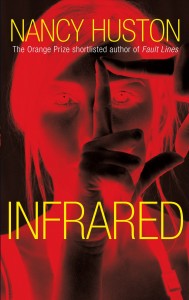 Published by Atlantic Books 4 December 2012
Published by Atlantic Books 4 December 2012
272pp, hardback, 12.99
Reviewed by Elsbeth Lindner
A forty-five-year-old woman takes her father and stepmother to Tuscany for a week, to celebrate his seventieth birthday. Hands up, grown-up children everywhere, who have made a similar gesture to an aged parent? Infrared may, then, be a book for you, especially if your dutiful love for your progenitor is a complex stew of anger, hurt, admiration and exasperation.
That’s how it is for Rena Greenblatt, a professional photographer with four husbands and two grown sons, now shepherding her father Simon and his irritating wife Ingrid (who calls him Dad) around the glories of Florence while maintaining her decades-old private discourse on the topic of childhood and how it has shaped her.
Rena’s interlocutor in these silent conversations is her special friend Subra, a melancholy blonde teenager first glimpsed in a Diane Arbus photograph and instantly recognized as a soul sister. Subra (Arbus backwards) is now a constant imaginary companion and confidant, as Rena juggles her temper, knowledge of the city, long-held guilts and memories. Simultaneously, she is musing on her relationships, especially the current one with Aziz in Paris, on the taking of photographs and the multi-faceted meaning, to her, of infrared.
Sex, warmth, photographic insight are all encompassed by the title and Huston is fearless (or shameless) about the layers of heavily relevant meaning she is able to heap upon the term. Professionally, Rena uses infrared film as a means of exposing the essence of her subjects. But with her strong sexual appetite, infrared can equate to the red- or white-hot electricity of the erotic. Also, ‘infrared reveals what I cherish more than anything else, what I’ve always longed for, what I lacked most as a child – warmth.’
So it goes, the continuous unpeeling of family and life recollections, mixed with the tedium of tourism, the delights of the landscape and the low-level stress of the holiday that drags Rena away from crises at home and work. She is Jewish, Canadian, a feminist, sister to Rowan, a boy treated harshly by their father who passed on the pain to Rena. During the week spanned by the novel, all this fertile tilth is ploughed up and sifted over, mixed with Galileo, Dante, Lorenzo de Medici, shot through with opinions on everything from the Virgin Mary, through race (Rena’s husbands are Haitian, Cambodian, Senegalese and Algerian) to tampons – and an inexhaustible preoccupation with sex.
It’s both engaging – comic, even farcical at times; shrewd; recognizable – and a rant, overwhelming in its tireless inhabitation of the interior of Rena’s skull. In the closing pages, a clutch of massive, revelatory, life- and change-threatening crises occur, propelling the narrative to an end but not a conclusion. Huston’s slice of middle-aged life is exactly that, a portion of the never-ending story. It will go on.
